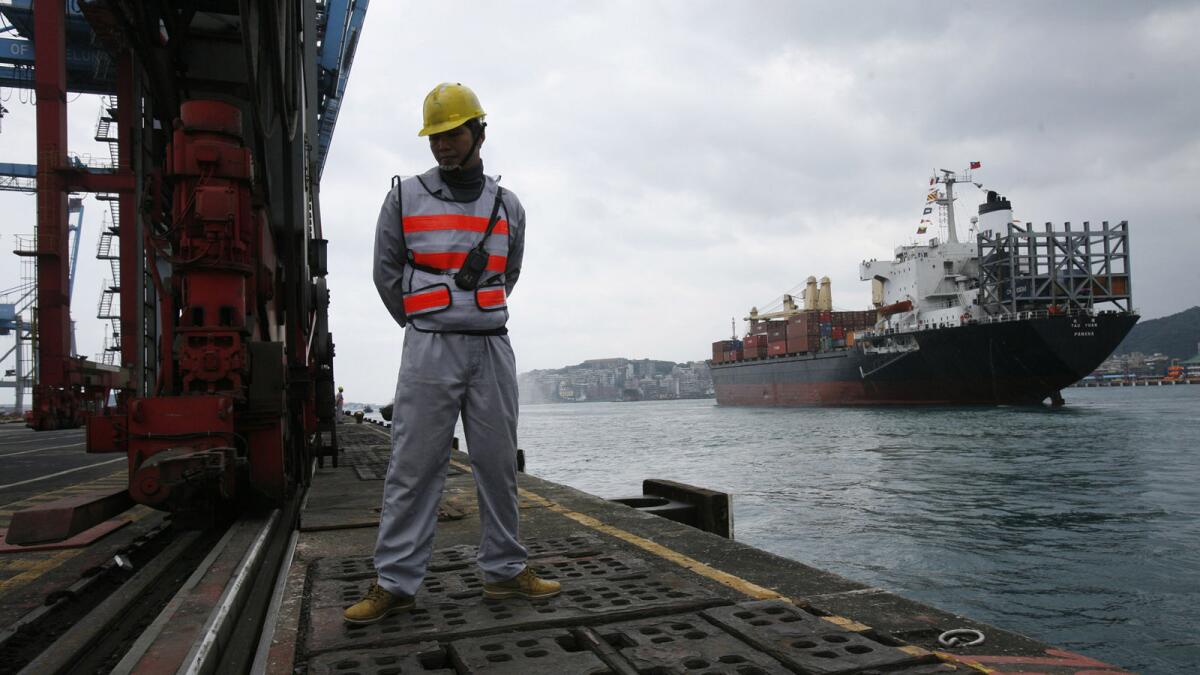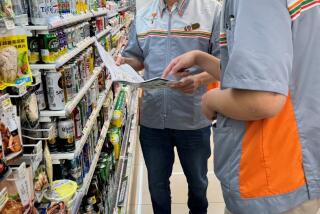As elections near, Taiwan voters mainly worry about money and jobs

A dock worker sees off a cargo ship leaving the northern Taiwan harbor of Keelung on Dec. 15, 2008.
- Share via
Reporting from Keelung, Taiwan — This rainy port city on Taiwan’s northern tip hit its peak as a shipping hub in 1984. But as China opened up its economy and became the world’s factory floor, business leeched away. Now most of the raucous sailor bars Keelung was famed for have closed, and one-third of its 370,000 people leave on weekdays to work in the capital, Taipei.
“When I was in my 20s, you could work in a factory that packs shipping crates and that was fine,” said Lo Ching-an, 50, owner of an often-empty tea store in central Keelung. “Now that’s basically gone. It’s really pathetic. Local people’s spending power isn’t too strong, and a lot work in Taipei. They just come back to rest.”
Residents’ best economic hope now is to catch the interest of cruise ship tourists, but most still disembark and immediately board buses for sightseeing in Taipei, 15 miles to the southwest. Voters threw out Keelung’s mayor last year and have the island’s two major political parties squirming days ahead of Saturday’s presidential and legislative election.
Keelung is hardly alone in its economic anxieties. Taiwan went into recession in September, and export orders have fallen every month since April. Demand is falling for goods such as high-tech hardware, and as exporters get squeezed, Taiwanese complain it’s hard to find a job that pays enough to afford a comfortable living.
While many overseas observers of Taiwan’s elections are focused on the self-ruled island’s fragile political relations with China, a large number of voters here simply want candidates to tell them how they’ll help people find jobs and earn money.
In part because of Taiwan’s economic malaise, the Nationalist Party -- which has controlled parliament and held the presidency since 2008 -- lost nine mayoral and country magistrate seats across the island in elections in late 2014. Keelung voters ousted their Nationalist mayor after eight years, installing a member of the Democratic Progressive Party for only the second time ever.
“Their political performance was terrible, from infrastructure to economic development, and people’s living standards were equally horrid,” said five-term Keelung City Council member You Hsiang-yao of the Democratic Progressive Party.
The economy is a major reason why opinion polls have shown DPP presidential candidate Tsai Ing-wen in the lead over the Nationalists’ Eric Chu.
Incumbent President Ma Ying-jeou has pushed closer economic links with mainland China to boost the island’s economy. John Deng, minister of economic affairs, said Friday that though there was a “slight slump” in trade volumes across the Taiwan Strait in 2015, in general, “business on both sides is thriving.”
But critics say the benefits have failed to trickle down.
To address those concerns, the Nationalists have pledged to raise Taiwan’s minimum monthly wage by 50% over four years -- to 30,000 Taiwan dollars, or $900 -- if Chu is elected. The DPP proposed last year changing labor laws to raise wages and shorten working hours, from 84 hours every two weeks to 40 per week.
During the shipping heyday, more than 2.2 million 20-foot-equivalent units (the volume of a standard-sized container) of cargo would pass each year through Keelung’s slate gray bay.
Though China’s growth hit Keelung’s shipping container traffic hard, locals also blame Taiwan policymaking. In 2009, a port management company under the transportation ministry shifted much of the city’s remaining business to a nearby port, in New Taipei City. That port faces the open sea and, unlike Keelung’s, its geography would allow it to be expanded with new construction projects.
Both the Nationalists and the DPP declined to estimate their support in Keelung. But You, the city councilor, said internal polls show the DPP candidate for parliament is leading his closest rival by 3 percentage points.
Tsai and the DPP have talked frequently about diversifying Taiwan’s trade relations away from mainland China, and pushing for homegrown innovation. But they’ve made few sweeping pledges for improving the economy, perhaps in part to avoid letting down voters later, some say.
“I think Taiwan’s structural problem will take a long time to solve, but people want to see some instant solutions and improvement,” said Andrew Tsai, economist at KGI Securities Investment Advisory in Taipei. “This would be the biggest challenge to a new president, because people’s expectation may be too high and would be disappointed to find that there is no silver bullet for Taiwan’s economy.”
Wang Jian-chyuan, vice president of the Chung-hua Institution for Economic Research, agreed.
“Taiwan is heavily reliant on China when it comes to investments and exports. It’s very difficult to separate ourself tradewise. It’s hard to make a U-turn from China. But Taiwan needs to find its niche,” he said. “It’s important to not put all our eggs in the China basket.”
In Keelung, vendors at the fish market shake their heads when asked about business. An oil painting exhibit at the giant Keelung Cultural Center sees only the occasional cruise-ship tourist who stumbles on it, even though thousands disembark every week from boats a block away, a staff member said.
Keelung has tried for years to reel in cruise ships carrying up to 4,000 people from North America or elsewhere in Asia. Cruise ship passenger arrivals to Keelung jumped to 800,000 least year, from 450,000 in 2014, largely due to the mass opening to mainland Chinese tourists since 2008. Forty percent of Taiwan’s tourists come from mainland China, government officials say.
Since his victory last year, Keelung’s mayor, Lin Yu-chang, has encouraged those passengers to stay in the city a while instead of hopping on tour buses headed for Taipei, an hour away.
Keelung’s incentives include preparing souvenir gift packs for tour agents to hand to disembarking passengers, and starting a local tour bus loop. Beginning this spring, the bus will connect the port to local attractions such as a historic customs building and harbor viewpoints.
“Keelung is really fitting for a day tour,” said Meg Huang, manager of the harbor-side YM Oceanic Culture & Art Museum. “I think in the future the city government will work hard to make people stay here.”
Some see tentative improvement already. Tourists who linger often reach the Keelung Miaokou Night Market area a few blocks inland, adding some buzz during the daytime to streets of food stalls festooned with yellow lanterns.
“Some of their spending power is pretty strong, especially the ones from Malaysia and Singapore,” said Tseng Mei-chen, owner of a clothing store behind the market. She said she expects cruise ships eventually to lift the service trade.
See more of our top stories on Facebook >>
Keelung’s port is also deepening water at two piers and redoing three publicly owned portal cranes to raise overall shipping capacity by 50%.
Keelung’s rank has sunk from the world’s seventh-busiest post in 1984 to so low that it has fallen off the chart, to 35% of its peak volume last year, the port company’s Keelung harbormaster Kao Chwan-kai said. Private firms involved in marine shipping have laid people off across the board since the port’s busiest period, he said.
“As marine cargo shipping volumes have fallen, so have the working population and job opportunities,” he said. His corporation wants the Port of Taipei to share Keelung’s marine shipping load, not replace it. “It’s not a competition, but a sharing of resources,” Kao said.
Jennings is a special correspondent. Staff writer Julie Makinen in Taipei contributed to this report.
ALSO:
How U.S. sailors almost started a crisis with Iran
Oscars 2016: Here’s why the nominees are so white -- again
Chino Hills 7-Eleven still waiting for its Powerball winner to come forward
More to Read
Sign up for Essential California
The most important California stories and recommendations in your inbox every morning.
You may occasionally receive promotional content from the Los Angeles Times.










